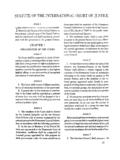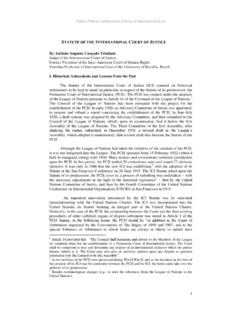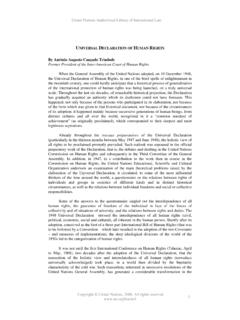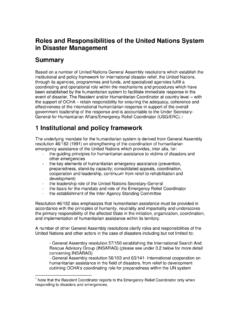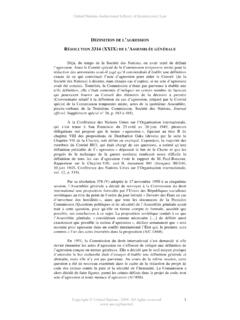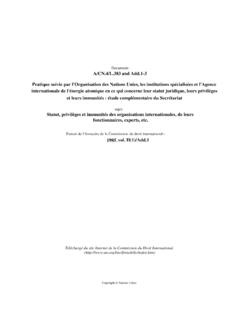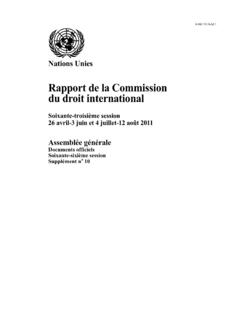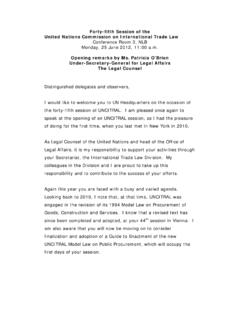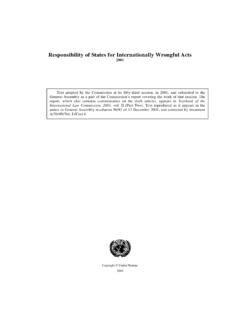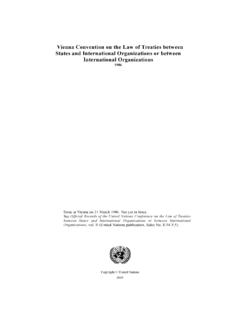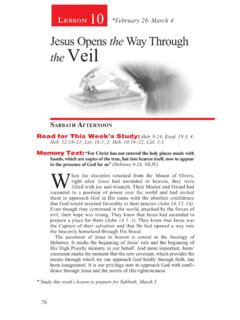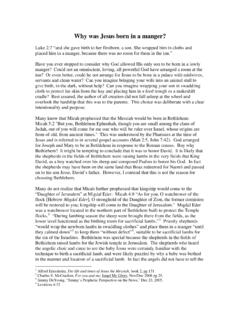Transcription of DECLARATION ON THE GRANTING OF INDEPENDENCE TO …
1 United Nations Audiovisual Library of International Law DECLARATION ON THE GRANTING OF INDEPENDENCE TO COLONIAL COUNTRIES AND PEOPLES By Edward McWhinney Professor of international law The DECLARATION on the GRANTING of INDEPENDENCE to Colonial Countries and Peoples was adopted by the United Nations General Assembly on 14 December 1960. The deliberate location of the United Nations vote in the General Assembly rather than in the Security Council where a permanent member s veto would always be available to any one or more of the three permanent members that still had colonial legal ties or associations was an obvious enough choice for the political activist States sponsoring resolution 1514 (XV).
2 And the timing of the vote in 1960, when the decolonisation process was already well under way was hardly fortuitous. A working majority in favour of a patently anti-colonialist measure would not become politically possible until the General Assembly s transformation from its original very narrow base of representation limited to the States members of the victorious wartime Alliance against Fascism to something more nearly reflective in cultural and ideological terms of the world community at large. By 1960, this had begun to be achieved, albeit on an intermittent, or casual, step-by-step basis, over the decade and a half from War s end. The numerical breakthrough had occurred as late as 1955, when 16 new States had been admitted in one big step to membership, bringing the total to 76.
3 In 1960 itself, 19 new States had been admitted, sealing the emergence of what became, in Cold War terms, a neutralist or uncommitted, majority voting coalition variously styled as the Non-Aligned bloc, the Group of 77, the Bandoeng group, the Developing or Third World countries. It was this informal electoral alliance, that provided the intellectual cohesiveness and also the political-tactical competence to secure the adoption of resolution 1514 (XV) without a single expressed dissent in the General Assembly. Why a DECLARATION , and not something with more obvious and immediate concrete political and legal consequences? The answer must be that it was partly tactical, to convert potential negative votes in the General Assembly into softer, legally ineffective abstentions.
4 But it also has something to do with the patently French civiliste, legal-systemic influences on its styling and drafting. The paradigm-model for resolution 1514 (XV) must be the great French D claration des droits de l homme et du citoyen ( DECLARATION of the Rights of Man and the Citizen) of 1789. Resolution 1514 (XV), like that historical example, is short and succinct, and written in clear, non-technical, often poetic language. In the end, the persuasiveness, in both political and legal terms, of resolution 1514 (XV) as DECLARATION must rest upon its claims to be an authoritative, interpretive gloss upon the Charter of the United Nations as originally written, amplifying and extending the Charter s original historical imperatives so as to encompass the new historical reality of the post-World War II international society of the drives for access to full sovereignty and INDEPENDENCE of erstwhile subject-peoples, in an emerging new, culturally inclusive, representative, pluralist world community.
5 Copyright United Nations, 2008. All rights reserved 1 United Nations Audiovisual Library of International Law In its substantive law stipulations, the DECLARATION postulates what may be described as ordering principles, intended to guide the progressive development of international law in accordance with the General Assembly s own explicit mandate under Article 13, paragraph 1 (a), of the Charter of the United Nations: that the subjection of peoples to alien subjugation, domination and exploitation constitutes a denial of fundamental human rights (art. 1); that all peoples have the right to self-determination, but that this necessarily includes the right freely to determine their political status and freely to pursue their economic, social and cultural development (art.)
6 2); that all armed action or repressive measures of all kinds directed against dependent peoples shall cease (art. 4); that immediate steps shall be taken, in United Nations Trust and Non-Self-Governing Territories or all other territories which have not yet attained INDEPENDENCE , to transfer all powers to the peoples of those territories (art. 5). And there is the warning, in the premonition of possible future post-decolonisation conflicts (as, at the time, in the former Belgian Congo), against any attempt aimed at the partial or total disruption of the national unity and the territorial integrity of a (post-decolonisation) country (art.
7 6); and as to the obligation of all States to observe the Charter of the United Nations and the Universal DECLARATION of Human Rights as to equality and non-interference in the internal affairs of all States, and respect for the sovereign rights of all peoples and their territorial integrity (art. 7). The DECLARATION s subsequent history, as a call for legislative activism affirmative action within the General Assembly (and, if politically opportune, within the Security Council) and certainly also for parallel initiatives in other coordinate United Nations institutions and agencies (the International Court of Justice in particular), has helped in a process of elevating the DECLARATION s claimed juridical status to the rank of imperative principles of international law (jus cogens)
8 , binding, as such, on the United Nations as authoritative interpretation of the Charter s norms and entering into general international law in the result. The DECLARATION was at the core of Security Council and General Assembly legislative initiatives that provided a legal base for reference to the International Court of Justice for Advisory Opinion in Namibia in 1971. The DECLARATION is also reflected, in its full spirit, in the International Court s Advisory Opinion ruling on Western Sahara in 1975. In the immediate political context of the drafting and the diplomatic lobbying leading on to its adoption, the DECLARATION was generally understood as being directed to salt-water Colonialism occupation of the lands and territories of indigenous, native or aboriginal peoples, in Africa, Asia and the Caribbean, who were physically separated by the oceans from their colonial Powers.
9 There is nothing in the language or the spirit of resolution 1514 (XV) inhibiting its legal extension to situations involving relations between European colonial Powers and other European or European-derived peoples overseas. In a major ruling, the International Court of Justice, being seised of a legal Copyright United Nations, 2008. All rights reserved 2 United Nations Audiovisual Library of International Law complaint of military and paramilitary support by the United States Government for forces from outside Nicaragua attempting to overthrow Nicaragua s elected government, may have come close in its strong judicial majorities to making such a connection.
10 Within the General Assembly itself, the DECLARATION gave birth immediately to further legislative acts whose ties of consanguinity to resolution 1514 (XV) are clear: resolution 1515 (XV) of 15 December 1960, on the sovereign right of States to dispose of their own wealth and natural resources and resolution 1803 (XVII) of 14 December 1962, on States permanent sovereignty over those natural resources. The further DECLARATION on the Establishment of a New International Economic Order and the related Programme of Action (resolutions 3201 (S-VI) and 3202 (S-VI) of 1 May 1974), and the Charter of Economic Rights and Duties of States (resolution 3281 (XXIX) of 12 December 1974) are demonstrations of the prophetic quality of resolution 1514 (XV) in providing an inevitable legal linkage between self-determination and its goal of decolonisation, and a postulated new international law-based right of freedom also in economic self-determination.
